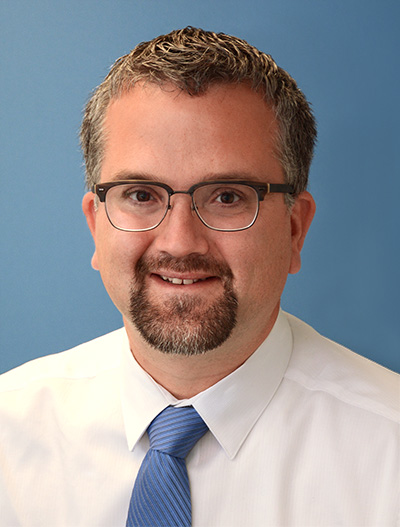CNY a return home for new Dean of Arts and Sciences
 This fall, SUNY Polytechnic Institute welcomes a new Dean of the College of Arts and Sciences to its ranks – Dr. Andrew Russell.
This fall, SUNY Polytechnic Institute welcomes a new Dean of the College of Arts and Sciences to its ranks – Dr. Andrew Russell.
Dr. Russell comes to SUNY Poly from Stevens Institute of Technology in Hoboken, New Jersey, where he was Interim Dean of the College of Arts & Letters, as well as Director of the Program in Science & Technology Studies and Associate Professor of History.
An experienced administrator, teacher, and scholar, Dr. Russell says he is at his happiest when he brings people from diverse backgrounds together to imagine new possibilities and bring them to fruition.
“I see a close alignment between my own experience and goals and the mission and future trajectory of the College of Arts and Sciences at SUNY Poly.”
Throughout his career, he has developed his core values in his education, scholarship, and teaching. He is a scholar of technology in its historical and contemporary settings, trained at Johns Hopkins University where he received his PhD in History of Science & Technology, the University of Colorado at Boulder where he earned a Master of Arts degree in History and Vassar College, where he graduated with a Bachelor of Arts in History.
“My activities as an educator center around three core values. First, I believe we must apply scientific and technical expertise toward positive social change. There is no question that science and technology can change the world; the challenge for our society now and in the future is to ensure that we use science and technology to create a better world. Second, I always seek to mobilize the values of collaboration and community. Individual study is the foundation of a sound education, but the most profound possibilities for educated individuals can be realized only through working with others. Third, I believe that teaching and learning in the liberal arts and sciences should cultivate a deep sense of empathy and justice. In a society that celebrates entrepreneurship and individual achievement, students need to learn that success means reaching beyond self-interest and toward the public good and the benefit of those who are less fortunate.”
Dr. Russell is the author of Open Standards and the Digital Age: History, Ideology, and Networks (Cambridge University Press, 2014), co-editor of Ada’s Legacy: Cultures of Computing from the Victorian to the Digital Age (ACM Press, 2015), and author of more than a dozen peer-reviewed articles and book chapters on topics such as history of the Internet, technology policy, modular design, and the governance of technical standards.
A native upstate New Yorker, Dr. Russell was born in Elmira and moved to the village of Clinton when he was 10 years old. His mother worked as a special education teacher and administrator at Westmoreland Central School and his father worked at Chicago Pneumatic until it closed. Through hard work, sacrifice and what he says is ‘some good luck,’ his parents were able to stay in the area, now living in New Hartford. While working for Stevens Institute of Technology he has enjoyed the experience of living close to New York City, his roots to central New York remained strong. He spends summer and winter vacations with family in the Adirondacks and through his family have personal connections to civic institutions in the Utica area, such as Habitat for Humanity and the Thea Bowman House.
For him, the return to central New York has been a return to home.
“I am delighted to see the levels of intelligence and investment that New York State has devoted to nanotechnology manufacturing in general and to SUNY Polytechnic Institute in particular, since I know from my academic work that focused government investments in research and education are key stimulants for technology-based regional development. I am equally delighted to see that the mission of SUNY Poly emphasizes civic responsibility and public service – values that very much align with my own personal values, my vision of higher education in the 21st century, and my sense of the community’s needs in central New York.”
Recent Comments
Archives
- September 2018
- August 2018
- May 2018
- April 2018
- March 2018
- February 2018
- January 2018
- December 2017
- November 2017
- October 2017
- September 2017
- May 2017
- April 2017
- March 2017
- February 2017
- January 2017
- December 2016
- November 2016
- October 2016
- September 2016
- August 2016
- May 2016
- April 2016
- March 2016
- February 2016
- January 2016
- December 2015
- November 2015
- October 2015
- September 2015
- August 2015
- May 2015
- April 2015
- March 2015
- February 2015
- January 2015
- December 2014
- November 2014
- October 2014
- September 2014
- August 2014
- May 2014
- April 2014
- March 2014
- February 2014
- January 2014
- December 2013
- November 2013
- October 2013
- September 2013
- August 2013
- June 2013
- May 2013
- April 2013
- March 2013
- February 2013
- January 2013
- December 2012
- November 2012
